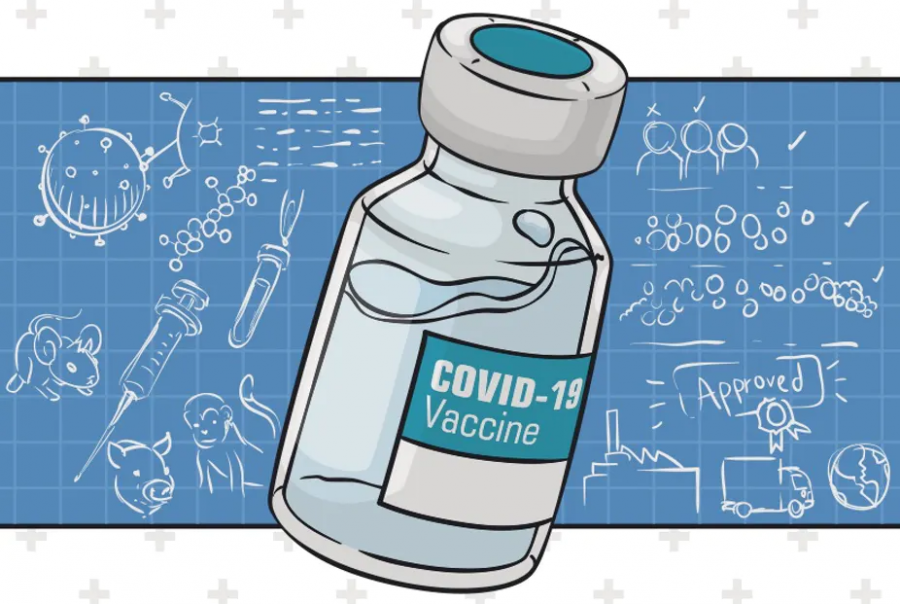What You Need To Know About Covid-19 Vaccines
January 27, 2021
In less than a year since the Covid-19 virus was first reported, the United States has approved and started to distribute two vaccines. Moderna, an American biotechnology company, and Pfizer, an American pharmaceutical company, both recently released two highly effective vaccines. These two vaccines show that even though the world has a long way to go in ending this pandemic, there is a light at the end of the tunnel, and it is getting brighter.
To fully understand how these groundbreaking vaccines work, it is imperative to understand the human immune system. Immune cells attack anything foreign in your body, such as a virus or bacteria. However, it takes up to a few days for your immune system to build up a full attack, say against a virus, but by that time that particular virus will have spread and replicated throughout your body. Once your immune system fights off the virus, it remembers it and how to beat it because of memory cells. (no, this does not have to do with you remembering a mathematical equation). Henceforth, the next time your body comes into contact with that same virus, your immune system will recognize it and fight it off before it can take root and possibly make you sick.
Regular vaccines insert a small amount of a particular virus in your system to help your body develop the knowledge on how to defeat this virus, so the next time the virus is in your body your immune system can beat it quickly and efficiently. The common flu vaccine has to be readministered every flu season and is only 60% effective. The new Covid vaccines are different from all of its predecessors and the first of its kind.
First of all, at the beginning of the pandemic scientists looked closely at the virus and its DNA to better understand how to defeat it. The Covid virus has a small, important protein on the outside of the virus that is responsible for the virus getting into your cells. Scientists agreed that the protein looked like a good place to launch an immune attack. They looked at the DNA sequence of the virus and found the blueprint for that particular protein. For those who may not know, DNA is the blueprint to make things in a cell, and cells transcribe it into RNA. RNA is the instructions that tell the cell what to make, while mRNA gives instructions to the cell to make something. So, scientists took the blueprint for that pesky protein and made an mRNA version of it. Those mRNA instructions are the vaccine.
The vaccine contains no actual part of the virus, only the instructions on how to make the protein. This makes the vaccine very safe because people cannot get infected with Covid from the vaccine.
So, your cells see the instructions that are in the vaccine and makes a lot of that particular protein discussed earlier. Your immune system sees the protein, classifies it as a foreign invader, and starts attacking it. It takes a few days to launch an all out war on this protein. Once your immune system destroys the foreign protein and your body breaks down the mRNA instructions, nothing left of the vaccine is in your body. Except the memory cells remember the protein and how to kill it. Now if Covid enters your body, your immune system is able to quickly and efficiently destroy that outside protein, and thus the Covid virus before it spreads and makes you sick. Genius right?
After two doses of one of the two vaccines available, you are basically immune to Covid. However, that does not mean you can go out and party because scientists are unsure if vaccinated people can still spread the virus. Also it is unknown how long the vaccine will last and when another booster of that vaccine will be needed.
The two vaccines approved by the United States are made by Moderna and Pfizer, and while they both use mRNA, they have some slight differences. Pfizer is approved for those 16+ in age, while Moderna is for those 18+. Pfizer is 95% effective, while Moderna is 94% effective. Pfizer must be stored and shipped at -94º Fahrenheit and Moderna must be shipped at -4º Fahrenheit. Both require 2 doses before a person reaches full immunization. Because of the supply and demand for these vaccines, people are not able to choose which type of vaccine to receive, but both are shown to be safe and effective.
Moderna and Pfizer are not the only companies involved in Covid vaccines. Three vaccines are in Phases 3 clinical trials in the U.S. as of now. These are AstraZeneca, Janssen, and Navavax. Stage 3 is the last stage of a clinical trial so hopefully even more vaccines will be approved and distributed soon!
While Covid vaccines are great at stopping the spread of the virus, as of right now vaccines alone are not sufficient to stop the spread. Research from Columbia University showed that even though people are starting to get vaccinated, millions more will become infected and get sick if restrictions are lifted too soon. So, continue to wear a mask, social distance, be considerate of others, and stay home as much as possible to help these novel vaccines end the pandemic.
